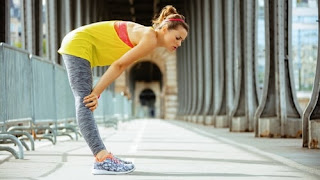In 1987, I was a student volunteer in Austria. Our group was building a house 110 km from Vienna. On a free day, I had borrowed the camp organiser’s bicycle and was gleefully riding it through Austria’s breathtaking landscape. It was a hill of some sort, and I immensely enjoyed going down at a speed more appropriate for a motorbike. When I started my return journey, I realized what uphill meant. (The bicycle had no gears). After a brief struggle, I got off and walked all the way up, dragging the bicycle alongside. I took twenty minutes to go down, and four hours to climb up the same distance.
Stock markets offer similar rides. If the $100 share
you hold goes down by 50%, its value becomes $50. If it then goes up by 50%,
the value becomes only $75. To restore the original $100, the share must shoot
up by 100%.
Going down is easy and fast. Climbing up is difficult
and slow. In the pandemic, everybody’s fitness level has gone down. Recently, two
professors at Anglia Ruskin University - Dan Gordon (Cardio respiratory
exercise physiology) and Justin Roberts (Health and exercise nutrition) analysed
the speed at which we become unfit.
*****
How do we increase our fitness? By doing something
more than our body is used to. The body takes stress, then adapts to it,
leading to higher fitness. When a marathon runner’s weekly mileage goes
gradually from 10 km to 80km, at every level they feel fitter. Fitness is the greatest
reward for such craziness.
VO, max is one of the modern measures of fitness.
(V=volume, O=oxygen, M=maximum). It measures the amount of oxygen a person can
use during exercise. The higher it is the better. The average untrained healthy
male has a VOmax of 35-40. This value exceeds 80 for elite marathon runners,
racing cyclists or Olympic skiers.
Fitness is an outcome of a combination of exercise,
diet, rest and sleep. It requires hard work and commitment. Losing it through
de-training happens rapidly.
*****
The professors took the case of a marathon runner
running regularly, about 90 km per week, for 15 years. If he stopped training
completely, as happened to many runners during strict lockdowns, the fitness
levels came down within weeks. When training was stopped, in the first four
weeks, VO2 Max declined by 10%. It continued to go down, at a slower rate over a
longer period.
For average people engaged in some sort of fitness
training, VO2 max falls sharply and in eight weeks they go back to pre-training
levels. In other words, the effect of all that exercise in the past may be
wiped out. (Sounds scary).
The reason is the reductions in blood and plasma
volumes by 12% in the first four weeks. This happens because we no longer put
the stress we used to on heart and muscle during exercise.
*****
Talking about strength, for an average person, 12
weeks without training causes a significant decrease in the amount of weight we
can lift. (Ask me, with my gym closed; I have gone for 64 weeks without weight
training). Fortunately, research shows that you retain some of the strength you
gained before you stopped training.
When we don’t work our muscles hard, they become lazy,
many muscle fibers decrease, resulting in the inability to lift as many weights
as we could pre-pandemic. After just two weeks of no weight training, number of
muscle fibers goes down by 13%.
When the lockdowns forced us to reduce or stop our
exercise, we started losing our fitness levels within 48 hours. But it took two
to three weeks for us to feel the effects on cardiovascular fitness and around
6-10 weeks for strength fitness. The professors say that the rates of
de-training for men, women and older athletes were similar.
*****
The lesson is to keep doing some exercise, any exercise,
which is permitted. And when eventually gyms and swimming pools open up, and
roads welcome marathoners and cyclists, we will need to put in a lot more
effort to regain our pre-pandemic fitness level.
Ravi

मला हे सांगणं म्हणजे पालथ्या घड्यावर पाणी
ReplyDeleteDoing our best - walking, walking!!
ReplyDelete